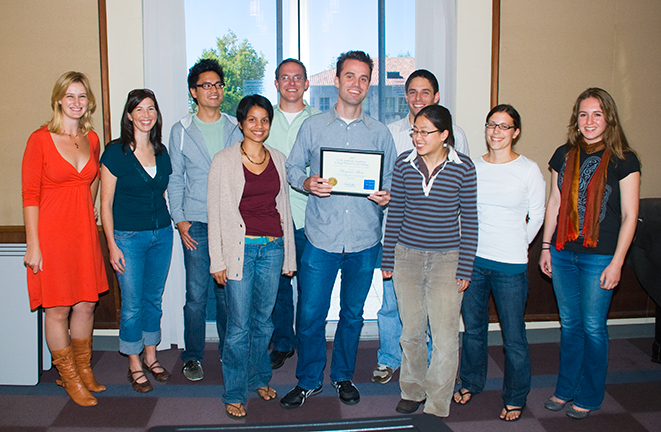
Benjamin Botts ’10 (center) surrounded by other CEB award nominees.
By Andrew Cohen
Benjamin Botts ’10 has won the first annual Continuing Education of the Bar (CEB) Award for Excellence in Legal Research and Writing at Berkeley Law. CEB manager Johanna Sherlin announced Botts as the winner at a luncheon ceremony Monday in the Goldberg Room, and presented him with a $2,500 check and a framed certificate.
The post-graduate organization provides practice guides, continuing education and other resources to California Bar members. It established the award to honor Berkeley Law students who demonstrate outstanding performance in legal research and writing. Botts and 11 classmates became eligible after earning Best Brief honors in their first-year Written and Oral Advocacy (WOA) sections last spring.
“It’s a great honor,” Botts says. “My opponent in WOA also won her section, and I was blown away by how good her brief was. The quality of writing throughout the course is really strong, so knowing that makes it feel pretty amazing to win this award.”
Other Best Brief winners nominated for the CEB award were Andy Dufresne, Christopher Franklin, Antonia Konkoly, Tejal Kothari, Michelle Lee, Joanna Lydgate, Hana Nielsen-Kneisler, Antonio Raimundo, Vanessa Reid, Blaire Russell, and Quinn Shean.
A panel of three Berkeley Law alumni evaluated their briefs: Contra Costa Superior Court Judge David Flinn ’63, former Alameda County Bar Association president Cheryl Hicks ’83, and former State Bar of California president Palmer Madden ’73. They determined the award recipient based on persuasive legal writing criteria, required citation style, and substantive analysis.
“Those three have read a lot of briefs,” Sherlin said at the award ceremony. “And I can tell you that they were all very, very impressed by the quality of the work they saw.”
Botts worked for three years as a paralegal at a small immigration law firm after earning his undergraduate degree from UC Berkeley, but had no legal writing experience before coming to law school. Like all first-year students at Berkeley Law, he completed the Legal Research & Writing course during fall semester, learning the basics of the court system and how to read cases, locate and select precedent, and write legal memoranda.
During the spring WOA course, 1Ls learn more advanced research techniques and how to write a brief to the court. After receiving a hypothetical case and getting assigned to either the plaintiff or defendant side, they research the case law, submit a written brief, and argue their position before a judge in a Moot Court setting.
“Many of us got to argue at the U.S. 9th Circuit, which for me was the most exciting part,” says Botts. “I had never thought of myself as someone who’d be really interested in standing up and arguing in court, but it was actually a lot of fun.”
Botts worked on a mock Americans with Disabilities Act (ADA) case that centered on whether a commercial website could be construed as a place of public accommodation. It was patterned after a recent case in which a blind UC Berkeley student sued Target, alleging that it violated the ADA by not making its website fully navigable by the visually impaired.
“The amount of work that goes into WOA is completely disproportionate to the one unit we get for the class,” says Botts, who plans to take more elective professional skills courses. “But the students in my section received excellent training from our WOA instructor, Erin Clarke, and it really was a great experience.”